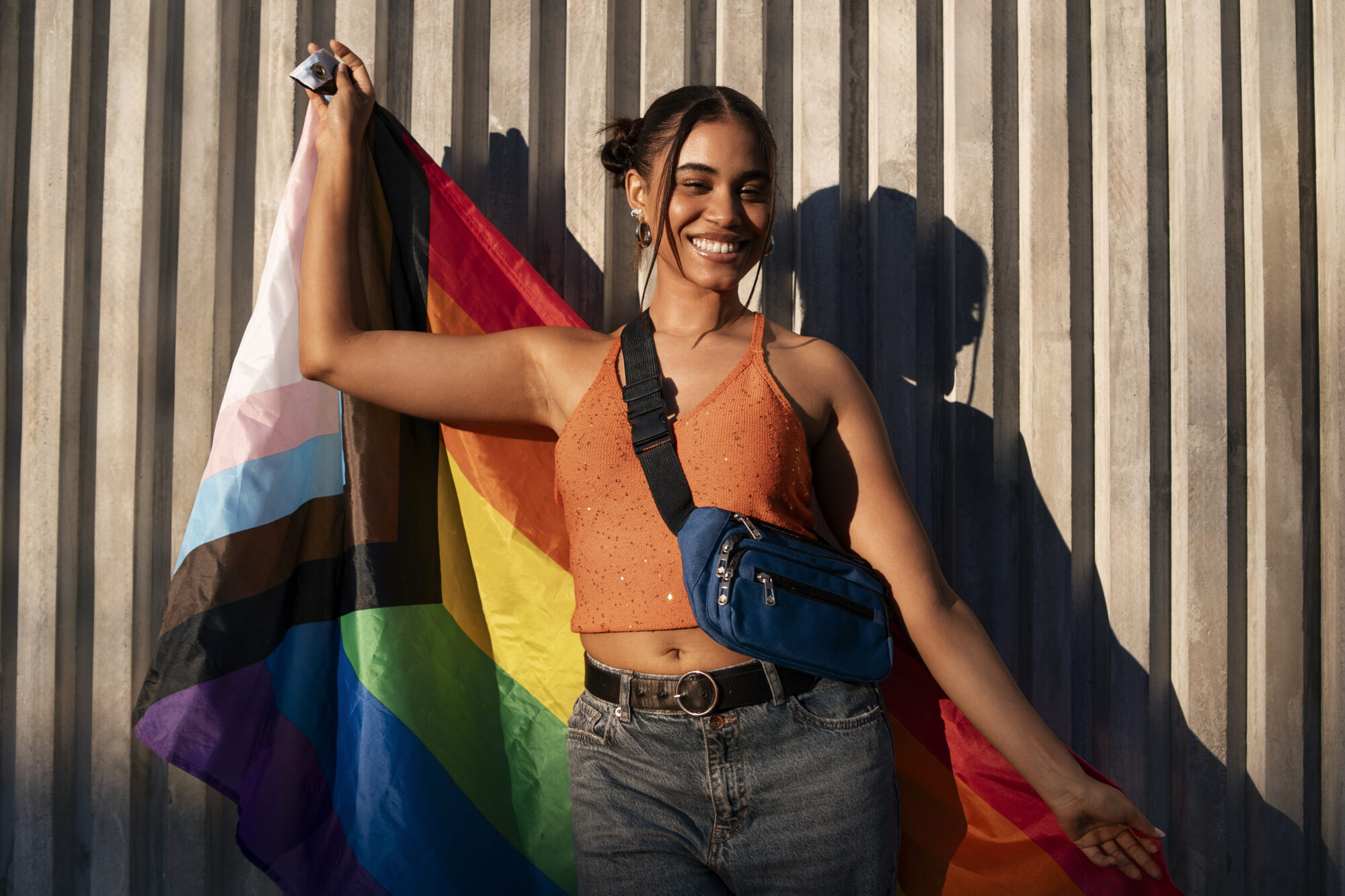Pride and Wellbeing
It’s June – we’re finally into the swing of summer,
and it’s Pride Month 2024!
You might have noticed rainbows sprouting from shop windows and community spaces while you’ve been out and about over the last few days. For LGBTQIA+ individuals and communities, June is a time to unite to celebrate and share identity Pride while also remembering and recognising past LGBTQIA+ experiences and campaigning for better and safer queer lives for today and tomorrow. For allies, it’s a reminder of the importance of taking action to aid the creation of a world which is more tolerant and accepting of us all.
Whilst Pride is a time to celebrate, it’s also a chance to raise awareness of the difficulties LGBTQIA+ people often encounter and take action to combat these. In this blog post, we’re doing so by exploring
LGBTQIA+ mental health, including how, as a queer individual or an ally, you can either receive support for your mental health or support the mental health of your LGBTQIA+ peers.
Our Use of Terminology
Before we get started, we’d like to explain our terminology use. In this blog post, we use the terms ‘LGBTQIA+’ and ‘queer’ as umbrella terms which aim to be as inclusive as possible when referencing lesbian, gay, bisexual, transgender, queer, questioning, intersex, asexual people or any other non-heterosexual or non-cisgender identities. The terms are also used by LGBTQIA+-centric charities such as Stonewall.
We do, however, acknowledge that every single human being is different. Our identities are constantly impacted by a complicated interplay of factors relating to age, socio-economic background, ethnicity, culture, religion, and more.
We always aim to promote tolerance, empathy, and understanding.
What is Pride?
We celebrate Pride in June, which is when the Stonewall riots took place. These riots occurred as a response to a homophobic raid carried out by the police on a bar called the Stonewall Inn in a gay area of New York in 1969.
These riots spread around the world and had a ground-breaking impact on gay rights, sparking openly gay marches and celebrations, including the
UK’s first Pride festival in 1972.
LGBTQIA+ Mental and Emotional Health and Wellbeing
Many of us experience fluctuating mental health, regardless of our sexuality or gender identity. However, recent research shows that LGBTQIA+ people are more likely to encounter mental health issues.
Cleo Madeleine is from a charity called Gendered Intelligence, which was created to take action to improve transgender people’s quality of life while improving society’s understanding of gender diversity. In her words,
“LGBTQIA+ people do experience higher rates of some mental health issues compared to the general population, including anxiety, depression, and suicidality.”
These mental health difficulties might include:
- Stigma, discrimination, or abuse.
- Experiencing homophobia, biphobia, or transphobia.
- This could be external, e.g., queer-phobic behaviour from peers, strangers, or friends/family. However, it could be a broader experience relating to wider society - an ever-present element of the environment or social setting you find yourself in.
- Alternatively, this homophobia, transphobia, or biphobia could be internalised, with queer individuals sometimes disliking or thinking badly of themselves due to their identity.
- Negative coming-out experiences or responses.
- Feeling socially isolated, rejected, or excluded.
As explained by
Cleo Madeleine, the mental health challenges LGBTQIA+ people face can also be caused by “poor access to support services and healthcare, economic precarity, and lower standards of living.”
The Current State of LGBTQIA+ Mental Health in the UK
Recent research has shown LGBTQIA+ mental health in the UK to be at a critical point.
- Speak up – talking to someone you trust about the mental health challenges you’re experiencing can be difficult but life-changing. This could be a friend, family member, manager, or helpline.
- Join an LGBTQIA+ support group.
- Prioritise self-care - look after your physical and mental health. Eat healthily, get enough sleep, exercise regularly, avoid drugs, limit alcohol intake, look after your sexual health, or find an LGBTQIA+ specific group/club to join where you can meet like-minded people.
- Talk to your GP.
- Find a therapist – talking through your feelings and learning coping strategies can help you process difficult emotions.
- Know your legal rights.
How Can Employers Support LGBTQIA+ People?
In 2021, a LinkedIn report revealed that 31% of LGBTQIA+ people have faced microaggressions or discrimination at work.
Whether you’re an LGBTQIA+ employee or a manager or employer looking to do more to support your team,
knowing what support you should receive or offer is essential.
- If you are LGBTQIA+, consider joining (or creating) an LGBTQIA+ specific group, club, or network at work to find other LGBTQIA+ colleagues.
- LGBTQIA+ acceptance shouldn’t be assumed, but should be actively encouraged, promoted, and supported.
- As a manager or employer, make sure that there are clear, consistently enforced anti-discrimination guidelines24.
- If you’re LGBTQIA+, explain your needs to your employer – seek workplace mental health support if needed, report discrimination, and be proactive about requesting things that would make your job easier.
- In the words of Cleo Madeleine, LGBTQIA+ acceptance and support “has to start from the top and be enacted through policy and management” – you shouldn’t just rely on LGBTQIA+ staff to create their own support networks.
DID YOU KNOW?
In a LinkedIn survey published in June 2021, of the respondents who were ‘out’ at work, 25% reported missing out on professional opportunities, the chance to advance, or being intentionally overlooked.
If You’re Not LGBTQIA+ - How You Can Be a Better Ally
Being a good ally can have a hugely positive impact on LGBTQIA+ people’s mental and emotional wellbeing.
Where to Go for Support
If you’re LGBTQIA+ are looking for support and someone to talk to about your mental health, the
following resources might be helpful:
- Mind – contains detailed information for LGBTQIA+ people and lists of contacts for mental health support.
- Gendered Intelligence – a transgender-led charity working to improve young trans people’s quality of life.
- Stonewall – a charity providing LGBTQIA+ people (and allies) with support/advice.
- akt (Albert Kennedy Trust) – exists to support LGBTQIA+ people aged 16-25.
- Imaan – specifically for LGBTQIA+ Muslims, this charity also has an online forum where you can chat and share your experiences of being a queer Muslim.
- Switchboard LGBT Helpline – an entirely LGBTQIA+-led support line providing users with information, advice, and a space to talk.
- LGBT Consortium – a database of LGBTQIA+ groups, organisations, charities, and projects which can help you find groups near you.
In Summary
Pride month is a time to celebrate and uplift the queer community, but it’s also a time to recognise the struggles they face. Mental health issues disproportionately impact LGBTQIA+ people, and there’s more we can all do, queer or ally, to improve LGBTQIA+ mental wellbeing.
While displays of Pride flags and rainbows serve as a vital visual celebration and recognition of every identity that finds belonging in the LGBTQIA+ community, what is of
critical importance is action: to make the world a safer place for everyone, regardless of gender or sexuality.






